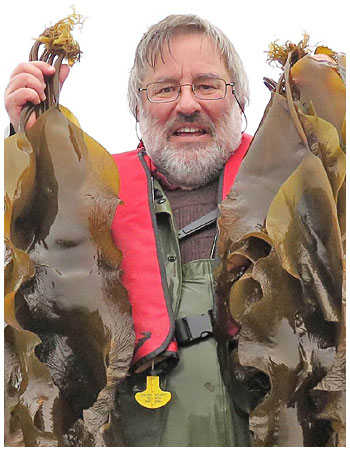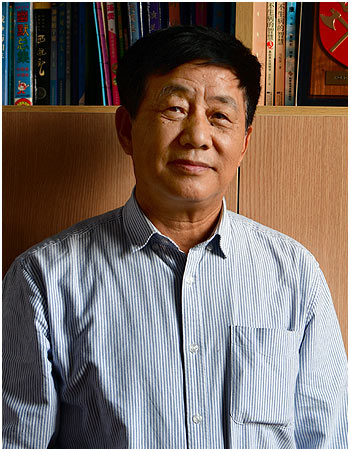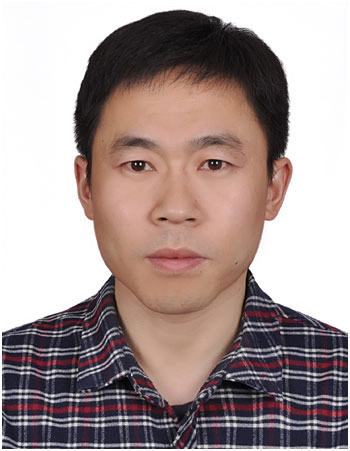brochure
AsianAqua-2018 will feature a pre-conference workshop
The topic of the Workshop is Integrated Multi-trophic Aquaculture: Responsibly farming waters by taking advantage of ecosystem services
The Workshop will be led by Prof. Thierry B. Chopin, Professor at University of New Brunswick, Canada
Dates: 1 – 2 December 2018
Venue: Room B-202, AITCC Hotel
The detailed technical program of the Workshop can be downloaded here.
Register below for the Workshop:
Download IMTA Training Brochure. If you want to register online for this training prgrame click here.
 Dr. Thierry Chopin was born and educated in France. He obtained his Doctorate from the University of Western Brittany, Brest, France. He moved to Canada in 1989 and is presently Professor of Marine Biology at the University of New Brunswick in Saint John.
Dr. Thierry Chopin was born and educated in France. He obtained his Doctorate from the University of Western Brittany, Brest, France. He moved to Canada in 1989 and is presently Professor of Marine Biology at the University of New Brunswick in Saint John.
Dr. Chopin’s research focuses on the ecophysiology, biochemistry and cultivation of seaweeds of commercial value and the development of Integrated Multi-Trophic Aquaculture (IMTA) systems for environmental sustainability (nutrient bio mitigation and other ecosystem services, and green technologies for improved ecosystem health), economic stability (improved output, product diversification, risk reduction and job creation in coastal communities) and societal acceptability (better management practices, improved regulatory governance and appreciation of differentiated and safe products).
Dr. Chopin has published 141 refereed papers, 23 book chapters, 47 non-refereed publications, 415 abstracts (presented at 254 scientific meetings in 41 countries on 6 continents), 1 English/French DVD, 4 YouTube videos and has frequent contacts with the media (magazine articles, newspapers/radio/TV interviews and documentaries in 256 media in 42 countries). He has given 97 invited seminars in 14 countries.
Dr. Chopin was, from 2010 to 2017, the Scientific Director of the Canadian Integrated Multi-Trophic Aquaculture Network (CIMTAN), an interdisciplinary strategic network of the Natural Sciences and Engineering Research Council of Canada (NSERC). He is the President of Chopin Coastal Health Solutions Inc. since 2016.
Dr. Chopin is Past President of the Aquaculture Association of Canada, the Phycological Society of America and the International Seaweed Association (of which he was also Secretary General for 6 years). He is an advisor to the International Foundation for Science and a member of the Editorial Boards of the journals Aquaculture International, Perspectives in Phycology, European Journal of Phycology, Journal of Applied Phycology, Aquatic Living Resources and Aquaculture Reports, and of the professional magazine Fish Farming International.
Dr. Chopin is the recipient of the NSERC Synergy Award for Innovation, the Aquaculture Association of Canada Research Award of Excellence, the New Brunswick Bio Sciences Achievement Award, the R3 (Research, Results, Recognition) Award of the New Brunswick Innovation Foundation and the Simply the Best Award of the UNB Associated Alumni.
Dr. Chopin is also Honorary Consul of France and Chevalier in the Ordre National du Mérite, the Ordre des Palmes Académiques and the Ordre du Mérite Maritime.
 Dr. Jian-guang FANG is a Research Professor at the Mariculture Ecology Division of
Yellow Sea Fisheries Research Institute(YSFRI), Chinese Academy of Fishery Science, Qingdao, China. He is the Director of the Key Laboratory of
Fishery Carbon-sink, Chinese Academy of Fishery Sciences. He also holds several key positions such as the Vice president of China Molluscan Society,
Director of Sea Ranching Research Centre, and ZoneCo Company. Prof. Fang graduated from Shandong Ocean College (now renamed as Ocean University of China)
with major on Marine Biology in 1982. His research areas include mariculture ecology, assessment of carrying capacity, Integrated Multi-trophic Aquaculture (IMTA),
and ecosystem approaches to environmentally friendly aquaculture. He has published about 200 papers and books in national and international scientific journals
dealing with mariculture, carrying capacity, shellfish seed production, and climate change.
Dr. Jian-guang FANG is a Research Professor at the Mariculture Ecology Division of
Yellow Sea Fisheries Research Institute(YSFRI), Chinese Academy of Fishery Science, Qingdao, China. He is the Director of the Key Laboratory of
Fishery Carbon-sink, Chinese Academy of Fishery Sciences. He also holds several key positions such as the Vice president of China Molluscan Society,
Director of Sea Ranching Research Centre, and ZoneCo Company. Prof. Fang graduated from Shandong Ocean College (now renamed as Ocean University of China)
with major on Marine Biology in 1982. His research areas include mariculture ecology, assessment of carrying capacity, Integrated Multi-trophic Aquaculture (IMTA),
and ecosystem approaches to environmentally friendly aquaculture. He has published about 200 papers and books in national and international scientific journals
dealing with mariculture, carrying capacity, shellfish seed production, and climate change.
 Dr. Jiang is a professor at Yellow Sea Fisheries Research Institute (YSFRI),
Chinese Academy of Fishery Sciences (CAFS). He received his PhD in Marine Biology from Institute of Oceanology, Chinese Academy of Sciences (IOCAS) in 2008.
His main research interest is in the development of sustainable marine food production systems that are sustainably integrated with the coastal and marine environment.
He has developed pilot-scale, integrated, marine aquaculture systems in collaboration with the aquaculture industries. Dr. Jiang is in charge of over 10
national and international projects, such as the branch task of the Modern Agro-industry Technology Research System, the scientific and technological
co-operation project between the National Science and Technology Foundation of Portugal and National Natural Science Foundation of China, the international
science & technology cooperation program of China, etc. He has published more than 60 peer-review academic papers. Dr. Jiang is a member of Marine Ecology Committee,
Ecology Society of China (ESC) and the PhD supervisor at Shanghai Ocean University of China. Beside his academic and research activities, Dr. Jiang has served as
reviewer of international journals such as “Aquaculture”, “PeerJ”, “Aquaculture Environment Interactions”, etc.
Dr. Jiang is a professor at Yellow Sea Fisheries Research Institute (YSFRI),
Chinese Academy of Fishery Sciences (CAFS). He received his PhD in Marine Biology from Institute of Oceanology, Chinese Academy of Sciences (IOCAS) in 2008.
His main research interest is in the development of sustainable marine food production systems that are sustainably integrated with the coastal and marine environment.
He has developed pilot-scale, integrated, marine aquaculture systems in collaboration with the aquaculture industries. Dr. Jiang is in charge of over 10
national and international projects, such as the branch task of the Modern Agro-industry Technology Research System, the scientific and technological
co-operation project between the National Science and Technology Foundation of Portugal and National Natural Science Foundation of China, the international
science & technology cooperation program of China, etc. He has published more than 60 peer-review academic papers. Dr. Jiang is a member of Marine Ecology Committee,
Ecology Society of China (ESC) and the PhD supervisor at Shanghai Ocean University of China. Beside his academic and research activities, Dr. Jiang has served as
reviewer of international journals such as “Aquaculture”, “PeerJ”, “Aquaculture Environment Interactions”, etc.
 Dr. Jang K. Kim is Associate Professor of Marine
Science at Incheon National University, Korea. Dr. Kim received his Ph.D. in Marine Botany at the University of Connecticut (UCONN), USA.
Dr. Kim currently serves as the Secretary of National Organizing Committee of 23rd International Seaweed Symposium which will be held in Jeju,
Korea in 2019. Dr. Kim is also a member of Editorial Boards of Journal of the World Aquaculture Society, Fisheries and Aquatic Sciences,
and Toxicology and Environmental Health Sciences.
Dr. Jang K. Kim is Associate Professor of Marine
Science at Incheon National University, Korea. Dr. Kim received his Ph.D. in Marine Botany at the University of Connecticut (UCONN), USA.
Dr. Kim currently serves as the Secretary of National Organizing Committee of 23rd International Seaweed Symposium which will be held in Jeju,
Korea in 2019. Dr. Kim is also a member of Editorial Boards of Journal of the World Aquaculture Society, Fisheries and Aquatic Sciences,
and Toxicology and Environmental Health Sciences.
His research focuses on interactions between marine algae and their environment. Along with his colleagues, Dr. Kim has developed
cultivation technologies for the native seaweed species in the USA. He is most interested in the development of integrated multi-tropic
aquaculture (IMTA) and nutrient bio-extraction systems. Recently, he and his research team have successfully applied the nutrient
bio-extraction technologies using seaweed aquaculture in urbanized estuaries in the Northeast of the USA. Their nutrient bio-extraction
study was nationally acknowledged by US EPA as one of the best management practices in 2012. Dr. Kim received the Connecticut Quality Improvement
Award (CQIA) Innovation Prize in 2013 for his seaweed aquaculture and nutrient bio-extraction research in the USA.
Once Dr. Kim joined the faculty at Incheon National University (2015), he has developed open water and land-based IMTA technologies suitable
for Korean waters. Most recently, he and his colleagues published several review papers in IMTA and seaweed aquaculture, including “Application of
open water integrated multi-tropic aquaculture to intensive monoculture: a review of the current status and challenges in Korea,” “Seaweed aquaculture:
cultivation technologies, challenges and its ecosystem services,” and “Opportunities, challenges and future directions of open water seaweed aquaculture
in the United States.”